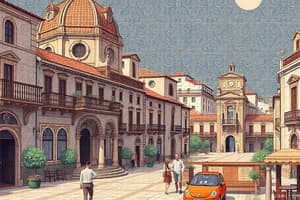Podcast
Questions and Answers
Why is tourism considered an assemble product?
Why is tourism considered an assemble product?
- Because it can be stored for future use
- Because it has limited possibilities
- Because it is a completely independent industry
- Because it involves collaboration between different organizations with specialized components (correct)
Why are tourism products not storable?
Why are tourism products not storable?
- Because they are independent of economic rules
- Because they have unlimited possibilities
- Because service production is fixed to time and space (correct)
- Because they do not require collaboration
Why is tourism referred to as a parasite industry?
Why is tourism referred to as a parasite industry?
- Because it is not free or independent and depends on external factors (correct)
- Because it involves unlimited ideas and knowledge creation
- Because it is easily storable
- Because it adds value through processes
What is meant by the term 'Tourism Value Chain'?
What is meant by the term 'Tourism Value Chain'?
How do backpackers experience transformation according to the text?
How do backpackers experience transformation according to the text?
What happens to a service if it is not sold within a given time?
What happens to a service if it is not sold within a given time?
What distinguishes tourism as a creation of knowledge or idea?
What distinguishes tourism as a creation of knowledge or idea?
In what way is the tourism industry compared to a value chain?
In what way is the tourism industry compared to a value chain?
How does service production relate to time and space?
How does service production relate to time and space?
Why does tourism business have unlimited possibilities?
Why does tourism business have unlimited possibilities?
Flashcards are hidden until you start studying
Study Notes
Introduction to Tourism
- Humans have been traveling since the beginning of time, initially for food, water, safety, or to acquire resources, but soon for pleasure and exploration.
Development of Travel
- Travel has always depended on technology, with early modes including walking, riding domesticated animals, and using the wheel and sail.
- The concept of a package tour or "round tour" originated from the Latin word "Tornos," meaning Turner's wheel.
Definition of Tourism
- Tourism refers to traveling or visiting places to explore, visit friends and relatives, or take a holiday.
- The word "tour" means traveling to know or discover new facts about a place.
Types of Visitors
- Internal visitors: persons who travel to a destination within their own country, outside their usual environment, for a period not exceeding 12 months.
- Same-day visitors: visitors who do not spend the night in a collective or private accommodation in the country visited.
- Tourists: visitors who stay in the country visited for at least one night.
Motivational Factors for Travel
- Traveling is a human instinct, driven by cultural traditions and the desire to experience new cultures.
- Two main motivational factors for travel: wonder lust (desire to discover new places, people, and cultures) and sun lust.
Types of Tourism
- Mass tourism: group travel to destinations for leisure, often as a package tour.
- Adventure tourism: travel involving exploration or activities with perceived risk, requiring specialized skills and physical exertion.
- Eco-tourism: responsible travel to natural areas that conserves the environment and improves local well-being.
- Sustainable tourism: visiting a place while making a positive impact on the environment, society, and economy.
- Recreational tourism: leisure activities for enjoyment, amusement, or pleasure.
- Health/Medical tourism: traveling to obtain medical treatment not available in one's own community.
- Convention tourism: tourism activities related to conferences and meetings in different locations.
- Village and urban tourism: tourism activities in rural or urban areas, utilizing local resources for maximum customer satisfaction.
- Ethnic tourism: selling and organizing tours to visit indigenous societies and learn about their customs and traditions.
- Cultural tourism: tours to culturally rich sites, providing knowledge of regional cultures.
- Historical tourism: tourism activities focused on historically important places, such as museums and palaces.
Studying That Suits You
Use AI to generate personalized quizzes and flashcards to suit your learning preferences.




